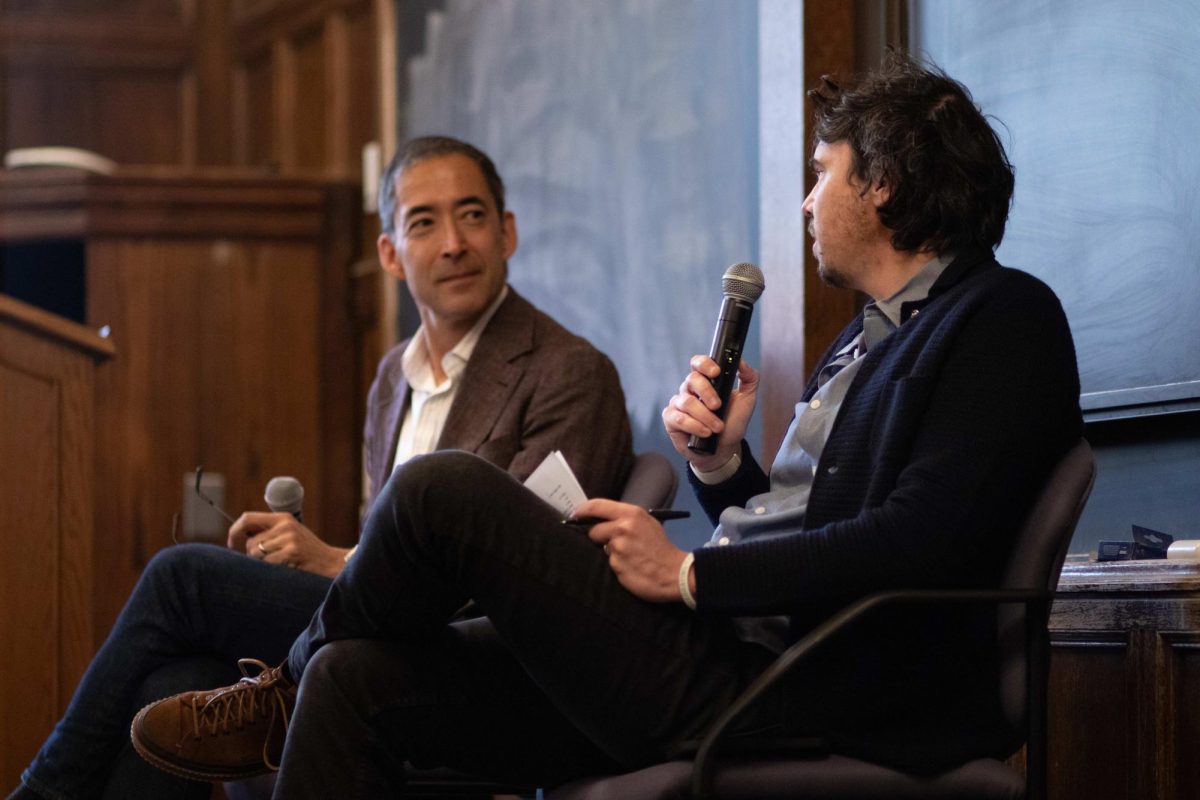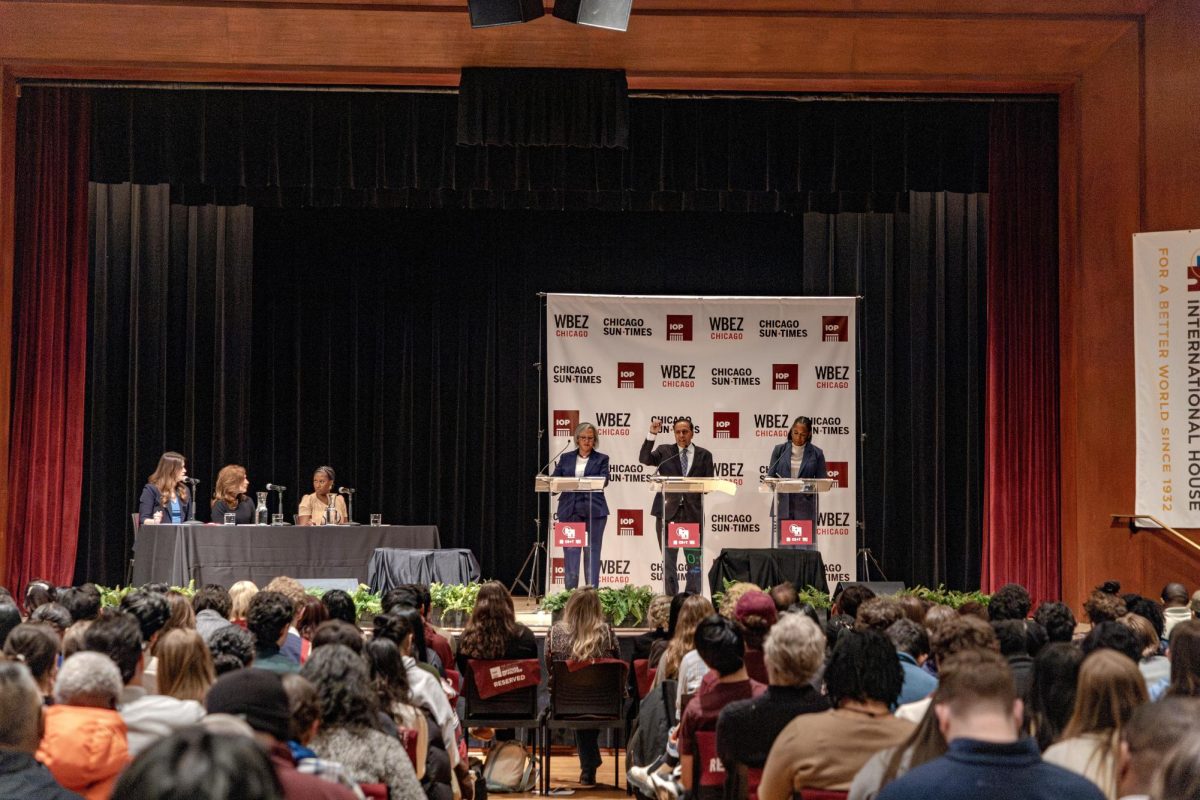UChicago Classics professor Clifford Ando blew the whistle on the University’s troubling financial state during a discussion with UChicago history professor Jonathan Levy organized by the Chicago Center for Contemporary Theory on November 3.
Ando began the talk by speaking about his motivation for writing a paper circulated prior to the event titled West Virginia Chicago Is Happening to You: The Fight for the Modern University. In the paper, Ando “uses public financial data to lay bare the risks to which university leadership exposed the community in a rush of leveraged investments over the last 15+ years,” per the discussion’s online description.
“My ambition is not to take issue with any given discipline or endeavor, nor, frankly, to complain about the subsidizing of particular units. What the University should be in the business of doing is making sure that many fields flourish, but we have gone far down the road in which research and teaching are assessed according to their susceptibility to be instrumentalized in pursuit of narrow economic and possessive, individualist things,” Ando said during the talk.
“I think we’ve gone far down the road in which the only fields that matter are ones that are essentially isomorphic with particular occupations.”
Levy commented about the diversity of UChicago community members present at the talk and about how important the discussion is for all parties.
“Looking out at the room, I see undergraduates, I see some master’s students, I see some Ph.D. students, I see some postdocs, I see faculty, I see emeritus faculty, I see staff, I see every member of the University here to have a conversation that we need to have.”
According to Ando’s paper, the University’s debt grew from $2.236 billion in 2006 to $5.809 billion in 2022, which represents an increase of 260 percent.
High levels of debt present a financial problem for the University because of rising interest payments. The University paid $45.7 million in interest payments in 2006. Ando claimed that payments averaged $200 million in 2021 and 2022.
Assuming that the University nets $60,000 in revenue from each undergraduate, Ando calculated that the tuition of more than 3,300 undergraduates—nearly half the number in the College—would be needed to just service debt every year.
“Any tuition-paying parent at the University of Chicago should ask themselves ‘Am I one of those parents whose tuition is going to pay for my child’s education? Or am I one of those parents whose tuition is just paying for debt?’ Maybe that will change our admissions,” Ando said during the talk.
The University’s financial problem is further compounded by the Federal Reserve’s interest rate hikes, which increase the cost of new debt. With $900 million in loans due over the next five years, the University is unlikely to secure generous terms when it seeks to borrow to pay off loans that are due. At the talk, Ando placed blame for the University’s poor finances both on the University’s trustees and on President Paul Alivisatos.
“If I had to single out some responsibility, the trustees have failed in something like their most basic function of guiding the University’s corporation so that it is in a position to flourish as an academic enterprise. Talking about the leadership of the University of Chicago, I think the inability of the presidential leadership of the University of Chicago, of all places, to articulate and defend the meaning of the university is impressive,” Ando said during the talk.
In the face of these troubling finances, Ando points out that the base compensation for the University’s president has increased by 285 percent from 2006 to 2022. He believes that the University’s nonprofit organizational structure may lead to an unhealthy level of risk-taking on behalf of the administration and uncommonly large compensation packages for University leadership.
“But university leadership—perhaps partly because universities are nonprofit and their efficiencies are hard to assess—is rewarded even more than corporate titans for socializing the costs of their own risk-taking or, you might say, for inflicting harm on their own organizations,” Ando writes. “The base compensation of the University of Chicago’s president therefore grew even in years when assets were sold, mass layoffs were made, and ‘merit’ compensation for many faculty was 0%.”
In response to financial shortfalls, Ando alleges that the University set limits on research spending, implemented a staff hiring freeze, and “cut budgets across the board.” These alleged cuts come as the University is supposedly spending more than $3 million to renovate President Alivisatos’s private residence. Ando claims that $3 million is “greater than the aggregate research allowances of all 250 plus faculty in the Divinity School and Division of the Humanities.”
Further, according to Ando, given that the Humanities Division spends just under 95 percent of its budget on salary and benefits, cutting budgets necessarily equates to either cutting staff or utilizing a greater proportion of instructional staff as opposed to more expensive research faculty.
“The effects of this change are also visible in the undergraduate College, whose own censuses of instruction—the so-called annual Johnson Reports—reveal that research faculty account for less and less of the instruction of undergraduates (from ’06 to ’20, the decline is 45% to 38% of undergraduate instruction by tenure-stream faculty) while non-tenure-stream instructors account for more and more (over the same period, an increase from 22% to 38%),” Ando writes. “Does this accord with the promises we make, even implicitly, to undergraduates? Is this in keeping with some of the highest tuition in the land?”
Ando believes that the cost-cutting measures employed by the University reflects a nation-wide “revolution in the notion of the University from ideal to instrument and of knowledge from end to means” and equate to an “assault on the liberal arts.”
“Where Chicago is concerned, the degradation of the Humanities and Social Science Divisions is short-sighted even on narrowly strategic grounds. Historically, they are the only units in the arts and sciences to score highly in international rankings. Treating one’s best and cheapest units as an ATM is an unforced error of such magnitude that it must be deliberate, the result not simply of error or despite, but of a fundamentally different view of what the university should be.”
Ando concluded his paper by cautioning the University against advancing professional schools at the expense of core Humanities and Social Science Divisions.
“The goal at Chicago appears to be the transformation of the university into a gleaming network of professional schools with a dispreferred and somewhat shabby teaching unit at its heart, the abandonment, in other words, of the idea of the research university that was current at its foundation and which Chicago itself did so much to cement in the national consciousness. That universities are moving in large numbers in the same dismal direction reflects the ideologically constrained worldviews that propel university leaders, presidents and trustees alike, to the choices they are making. Financial difficulty is the context and not the cause of this transformation. We should dissent from this vision and this process,” Ando concludes.
Ando’s paper will be published in The Chronicle of Higher Education.










Homu / Aug 10, 2024 at 3:13 am
Does the University of Chicago value the fundamental principle of honesty at all times? While institutions like Stanford have rescinded offers due to a small lie about volunteer hours on an undergraduate application, the University of Chicago ignored the integrity in academia of its graduate who gained his ‘first bucket of gold’ in academia by academic misconducts and constructed research experiences and continues value and award him as a academic star.
nobody / Jul 24, 2024 at 9:48 pm
Maybe the University values too much on high IF papers like Nature and Science and “Young Rising Star” which will help it increase its ranks. As one of its “rising stars” said, people would only focus on the “outcome” and his success, who cares how he got the success?
W. Sterner / Nov 13, 2023 at 7:20 pm
For whatever reason, one very important fact not mentioned in Prof. Ando’s trenchant analysis is that Robert Zimmer was president from 2006 to 2021. Most of these pedagogical and financial directions originated with the Board of Trustees and Zimmer during that time, who was also the highest paid university president in the US for one of his years in office.
P Brust / Nov 2, 2024 at 7:43 pm
Robert Zimmer was the highest paid university president in the country in 2011 and one of the highest paid the other years. I’ve long wondered what projections were done before some of Pres. Zimmer’s initiatives were approved by the Board of Trustees. Were the analyses faulty, incomplete or lacking in scrutiny? (In addition to the borrowing decisions that still haunt the institution.)